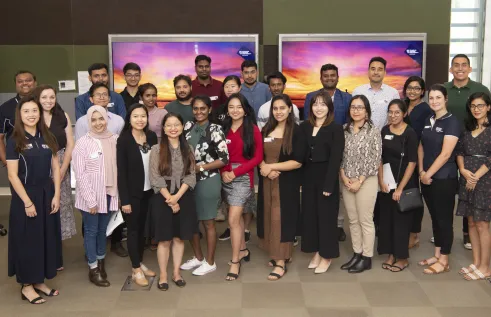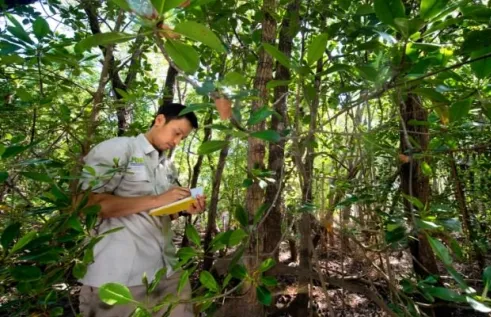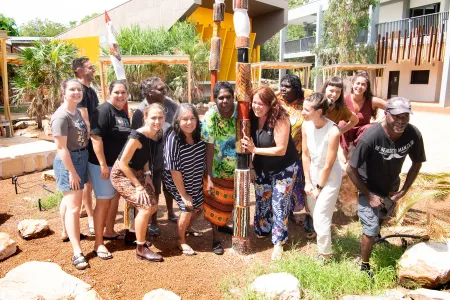The Doctor of Philosophy (PhD) and Master’s by Research (MRes) are the highest tertiary qualifications in Australia, Australian Qualifications Framework (AQF) Levels 9 and 10.
Candidates are expected to carry out their research with some autonomy and to demonstrate an original and critical research project, resulting in a thesis that makes a significant contribution to existing knowledge in their field of research both nationally and internationally.
Candidates will be mentored by a specialist academic supervisory team throughout their studies.
Entry requirements
Doctor of Philosophy (PhD)
To be eligible for entry to a PhD you should have completed either:
- an Australian Bachelor Honours degree or the international equivalent* which included a substantial research componentsuch as a thesis and a result of second-class honours division A or above
- an Australian Masters qualification or the international equivalent* which included a substantial research component such as a thesis
*Providing academic transcripts that clearly list the research units, a copy of your thesis and/ or more information about the research units you completed will help us assess the equivalence of qualifications completed outside Australia.
Please note research experience in the form of publications or creative outputs may be used to increase an honours score or honours equivalency—contact the HDR Team for further guidance.
English proficiency requirements apply to both domestic and international applicants see English Language Proficiency Policy / Governance Document Library (cdu.edu.au) for details.
Masters by Research (MRes)
To be eligible for entry to a MRes you should have completed either:
- an Australian Bachelor Honours degree or the international equivalent*, which included a substantial research component such as a thesis and a result of second-class honours division B or above
- an Australian Masters qualification or the international equivalent*, which included a substantial research component such as a thesis.
*Providing academic transcripts that clearly list the research units, a copy of your thesis and/ or more information about the research units you completed will help us assess the equivalence of qualifications completed outside Australia.
Please note research experience in the form of publications or creative outputs may be used to increase an honours score or honours equivalency—contact the HDR Team for further guidance.
English proficiency requirements apply to both domestic and international applicants see English Language Proficiency Policy / Governance Document Library (cdu.edu.au) for details.
Start your research journey
How to apply (domestic students)
**These steps relate to domestic applicants only - Australian and New Zealand citizens and permanent residents. International applicants, please choose "International" content at the top of this page or email international@cdu.edu.au
1. Check your eligibility
We welcome an application from prospective students. To enable your successful completion, the University assesses academic qualifications, research experience and areas of interest.
2. Find an available project and identify potential supervisors
Finding an appropriate supervisor is the key moment in summoning a successful PhD candidature. CDU ensures that students are supported by a Principal Supervisor and a panel of experts, including, where relevant, industry professionals spanning from civil engineering through to GLAMS (Galleries, Libraries, Archives and Museums).
Browse potential supervisors and project options below:
Available Research Projects
Research Opportunities with the Faculty of Science and Technology
Research Opportunities with Menzies School of Health Research
Research Opportunities with the Faculty of Health
3. Identify financial support for your research degrees
Financial support for research degrees, including scholarships for living expenses (often called a stipend) and a tuition fee offset, enables you to focus full-time on your research project.
CDU offers a number of different competitive scholarship schemes for domestic research students. To find out more about these scholarships, or to apply for a research scholarship, please visit the CDU Research Scholarship page
For external scholarship opportunities, please visit the Scholarship Finder page.
You can also contact our Scholarships team for enquiries regarding CDU external scholarships.
4. Fill out and submit your application
Australian and New Zealand citizens and permanent residents fill out and submit the online HDR Candidature and Scholarship application below (**International applicants, to avoid delays in processing your application, please DO NOT complete this form. Instead, email international@cdu.edu.au for access to studylink application portal**)
Fill out the Domestic HDR Candidature and Scholarship Application
Financial support for research degrees
International students entry requirements
Completing your Master by Research or PhD is an opportunity to specialise in your chosen field and contribute to delivering real and measurable impact in Northern Australia and beyond. Find out what you can study with CDU.
Master by Research (MRes)
To be eligible for entry to an MRes, you should have completed either:
- an Australian Bachelor Honours degree or the international equivalent which included a substantial research component such as a thesis and a result of second-class honours division B or above
- an Australian Masters qualification or the international equivalent, which included a substantial research component such as a thesis.
Doctor of Philosophy
To be eligible for entry to a PhD you should have completed either:
- an Australian Bachelor Honours degree or the international equivalent* which included a substantial research componentsuch as a thesis and a result of second-class honours division A or above
an Australian Masters qualification or the international equivalent* which included a substantial research component such as a thesis
*Providing academic transcripts that clearly list the research units, a copy of your thesis and/ or more information about the research units you completed will help us assess the equivalence of qualifications completed outside Australia.
English entry requirements for HDR degrees
A minimum IELTS (Academic) score of 6.5 with no band less than 6.0, or an equivalent English proficiency test result is required for entry into a Higher Degree by Research at CDU. However, please refer to the entry requirements page for more information on the forms of demonstrating English language proficiency.
For more information on Honours' equivalence and documentation (for example copies of peer-reviewed academic publications), see Higher degree by Research – Admission and Enrolment Procedure.
Entry requirements
Completing your Master by Research or PhD is an opportunity to specialise in your chosen field and contribute to delivering real and measurable impact in Northern Australia and beyond. Find out what you can study with CDU.
Master by Research (MRes)
To be eligible for entry to an MRes, you should have completed either:
- a Bachelor Honours degree with first-class or second-class honours
or - a Master by Coursework or Extended Masters, which contains a substantial research component
Doctor of Philosophy
To be eligible for entry to a PhD you should have completed either:
- a Bachelor Honours degree with first-class honours or second-class honours division
or - a Master's qualification that contains a substantial research component
English entry requirements for HDR degrees
A minimum IELTS (Academic) score of 6.5 with no band less than 6.0 or an equivalent English proficiency test result is required for entry into a Higher Degree by Research at CDU. However, please refer to the international student's entry requirements page for more information on the forms for demonstrating English language proficiency.
For more information on Honours' equivalence and documentation (for example copies of peer-reviewed academic publications), see Higher degree by Research – Admission and Enrolment Procedure.
How to apply for international students
1. Check your eligibility
To be eligible for a Masters by Research, you must have completed
- the equivalent of half a semester of research activity at a postgraduate level
- comparable levels of research, such as scholarly publications.
To be eligible for a Doctor of Philosophy, you must have completed
- the equivalent of one semester of research activity, such as a thesis, at a Masters level
- the equivalent of one semester of research activity at an Honours or Graduate Diploma level and achieved a distinction or higher overall
- comparable levels of research, such as scholarly publications
2. Identify a project and supervisor
Identifying a supervisor and a project is a crucial step before applying for admission into a research degree at CDU:
- If you have not already developed a project outline here is a list of projects that CDU academics are willing to supervise.
- If you have not identified a supervisor, please skim our supervisor profiles or for more comprehensive information, visit our Research Webportal
As part of the application process, you must provide written confirmation from a CDU supervisor that they are willing to supervise your proposed project.
3. Collate the necessary documentation
The online application process allows you to attach the relevant documents to your application. The following forms and documents are required to be submitted:
- Certified copies of all post-secondary qualification documents such as transcripts of results, award certificates, grading systems, and English translations, if required
- Project Outline – all applications must be accompanied by a brief research outline (1500-1700 words or 3-4 pages) on the proposed research project. Your outline should include: project title; general field of research; proposed principal supervisor; brief description; ethical considerations; resource implications; field work requirements; and any other relevant issues to the research.
- Proof of English language proficiency – please visit our Entry Requirement page for more information: https://www.cdu.edu.au/international/how-apply/entry-requirements
- Copy of passport showing personal and visa details
- Detailed CV / Resume with a list of publications
- Two referee reports should be completed via this online form.
- A well-written Statement of Purpose (Single) or Statement of Purpose (Family)
- Supervisor’s confirmation in writing (e.g. email correspondence)
- Other supporting documentation, if applicable
4. Apply online
Applications to CDU must be submitted online. The process is simple; all you need is a valid email address to create your online account. Once you have started the application, you will have the option of saving your application and resuming it later. There is no application fee when you apply online.
Higher Degree by Research degrees are categorised as either low-cost or high-cost fields of education. Applicants can select either low-cost or high-cost during the application process, however, these costs are determined upon approval for an offer of admission. There is no difference in the entry requirements or documents required for a full application.
If you require further assistance, please contact CDU Global.
You might be interested in
-

International student scholarships
CDU offers an exciting and generous range of scholarships to support international students coming to study at CDU from around the globe.
International student scholarships -

Sigit’s research to shape Indonesian environmental policy
There’s nothing more compelling to a researcher than knowing their work will have a real-world impact in an area of true significance. This is the case for international higher degree by research (HDR) student, Sigit Sasmito. His research into the impact of human behaviour on mangrove forests is set to define environmental policy for his home country of Indonesia.
Read more
Adding further proof that CDU's HDR students are doing research with real influence, one of Sigit’s thesis chapters was recently published in Global Change Biology; one of the world’s most-respected journals in environmental science. Here's his story.




